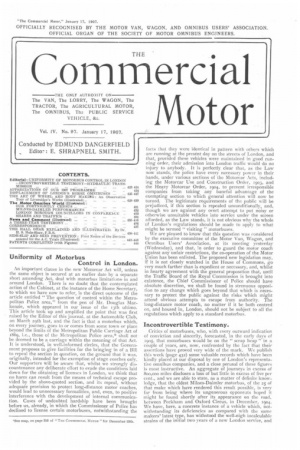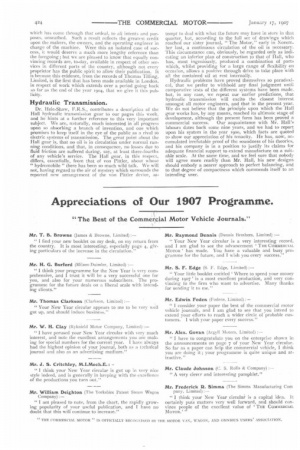Uniformity of Motorbus Control in London.
Page 5

Page 6

If you've noticed an error in this article please click here to report it so we can fix it.
An important clause in the new Motorcar Act will, unless the same object is secured at an earlier date by a separate short amending Act, deal with motorbus limitationsin and around London. There is no doubt that the contemplated action of the Cabinet, at the instance of the Home Secretary, to which we have now to refer, is the direct outcome of the article entitled "The question of control within the Metropolitan Police area," from the pen of Mr. Douglas Mackenzie, which appeared in our issue of the 13th ultimo. This article took up and amplified the point that was first raised by the Editor of this journal, at the Automobile Club, on March 29th last, and the fact is that a motorbus which, on every journey, goes to or comes from some town or place beyond the limits of the Metropolitan Public Carriage Act of 1869, i.e., those of the Metropolitan Police area,* shall not be deemed to be a carriage within the meaning of that Act. It is understood, in well-informed circles, that the Government proposes to give facilities for the bringing in of a Bill to repeal the section in question, on the ground that it was, originally, intended for the exemption of stage coaches only. Our supporters will be aware that, whilst we strongly discountenance any deliberate effort to evade the conditions laid down for the obtaining of licenses in London, we think that no harm can result from the means of technical escape provided by the above-quoted section, and its repeal, without adequate provision to protect long-distance motor coaches, would lead to unnecessary formalities, and, even, to positive interference with the development of internal communication. Cases of undoubted hardship have been brought before us, already, in which the Commissioner of Police has declined to license certain motorbuses, notwithstanding the facts that they were identical in pattern with others which are running at the present day on the streets of London, and that, provided these vehicles were maintained in good running order, their admission into London traffic would do no injury to anybody. It is perfectly clear that, as the Law now stands, the police have every necessary power in their hands, under various sections of the Motorcar Acts, including the Motorcar Use and Construction Order, 1903, and the Heavy Motorcar Order, 1904, to prevent irresponsible companies from taking any baneful advantage of the exempting section to which general attention will now be turned. The legitimate requirements of the public will be prejudiced, if this section is repealed unconditionally, and, though we are against any overt attempt to put noisy or otherwise unsuitable vehicles into service under the screen afforded, as the Law stands, it is not obvious why the whole of London's regulations should be made to apply to what might be termed " visiting " motorbuses.
We are pleased to know that this question was considered by the executive committee of the Motor Van, Wagon, and Omnibus Users' Association, at its meeting yesterday (Wednesday), and that, in order to guard the motor coach against any unfair restrictions, the co-operation of the Motor pnion has been enlisted, The proposed new legislation may, if it is not closely watched in the House of Commons, go very much farther than is expedient or necessary, and, whilst in hearty agreement with the general proposition that, until the Traffic Board of the Royal Commission is brought into existence, the Chief Commissioner of Police should have absolute discretion, we shall be found in strenuous opposition to any change which goes beyond that which is necessary to protect the public against the risks which might attend obvious attempts to escape from authority. The long-distance motor coach, no matter if it be both centred on, and housed in, London, should not be subject to all the regulations which apply to a standard motorbus.
Incontrovertible Testimony.
Critics of motorbuses, who, with every outward indication of conviction and sincerity, forecasted, in the early days of 1905, that motorbuses would be on the "scrap heap" in a couple of years, are, now, confronted by the fact that their assertions have proved very wide of the mark. We publish this week (page 432) some valuable records which have been kindly placed at our disposal by one of London's representative omnibus companies, and a close perusal of these figures is most instructive. An aggregate of journeys in excess of Soo,000 miles discloses a loss of but little in excess of five per cent., and we are able to state, as a matter of definite knowledge, that the oldest Milnes-Daimler motorbus, of the 25 of that make which have rendered this result possible, is very far from being where its ungenerous opponeats hoped it might be found shortly after its appearance on the road, between Peckham and Oxford Circus, in December, 1904. We have, here, a concrete instance of a vehicle which, notwithstanding its deficiencies as compared with the same makers' latest type, has withstood the well-nigh incalculable strains of the initial two years of a new London service, and
which has come through that ordeal, to all intent, and purposes, unscathed. Such a result reflects the greatest credit upon the makers, the owners, and the operating engineer in charge of the machine, Were this an isolated case of success, it would deserve a much more lengthy reference than the foregoing; but we are pleased to know that equally convincing records are, to-day, available in respect of other services in different parts of the country, although not every proprietor has the public spirit to allow their publication, it is because this evidence, from the records of Thomas Tilling, Limited, is the first that has been made available in London, in respect of work which extends over a period going back so far as the end of the year 1904, that we give it this publicity.
Hydraulic Transmission.
Dr. Hele-Shaw, F.R,S., contributes a description of the Hall hydraulic transmission gear to our pages this week, and he hints at a further reference to this very important subject. We are., naturally, much interested in all progress upon so absorbing a branch of invention, and one which promises to keep itself in the eye of the public as a rival to electric systems of transmission. The great point about the Hall gear is, Lhat no oil is in circulation under normal running conditions, and that, in consequence, no losses due to fluid friction are suffered during, say, at least three-fourths of any vehicle's service. The Hall gear, in this respect, differs, essentially, from that of von Pittler, about whose " hydromobile " there has been so much wild talk. We will not, having regard to the air of mystery which surrounds the reported new arrangement of the von Pittler device, at tempt to deal with what the future may have in store in that quarter, but, according to the full set of drawings which reached our sister journal, " The Motor," early in November last, a continuous circulation of the oil is necessary. This circumstance can, obviously, be regarded only as indicating an inferior plan of construction to that of I lall, who has, most ingeniously, produced a combination of parts which, whilst providing for a large range of flexibility on occasion, allows a positive through drive to take place with all the contained oil at rest internally. Hydraulic problems have proved themselves so paradoxical, that we prefer to withhold any final judgment until comparative tests of the different systems have been made, but, in any case, we repeat our earlier predictions, that hydraulic transmission will excite the closest interest amongst all motor engineers, and that in the present year. We do not believe that the principle upon which the Hall gear works has, by any means, reached its ultimate stage of development, although the present form has been proved a commercial Success. Our acquaintance with Mr. Hall's labours dates back some nine years, and we had to report upon his system in the year 1900, which facts are quoted to show our appreciation of his tenacity. He has, now, accumulated irrefutable proof of the soundness of his theories. and his company is in a position to justify its claims for adequate financial support to extend manufacture on a suitable scale. At the same time, and we feel sure that nobody will agree more readily than Mr. Hall, his new designs should embody a nearer approach to perfect balancing, and to that degree of compactness which commends itself to an intending user.


























